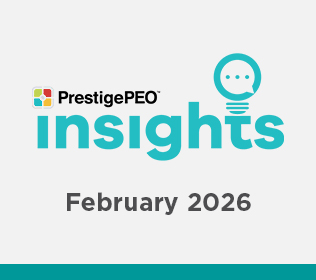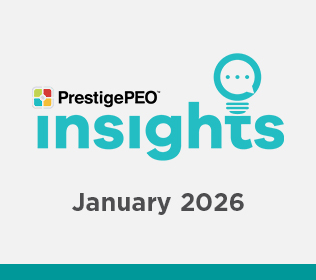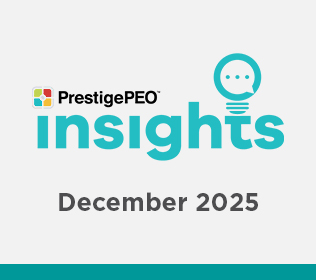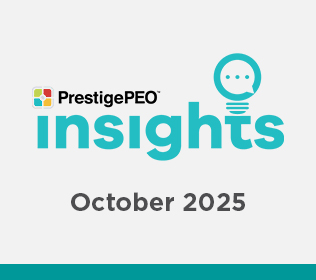
The latest news relevant to you and your business


Excitement is in the air at PrestigePEO as we kick off the 2024 Open Enrollment season! We’re proud to unveil a range of new voluntary benefits and enhancements to our Renewal Portal. These innovations, inspired by the valuable insights from our clients and broker partners, were developed to streamline your benefits process and improve your employee planning and contribution strategies.
We recognize the importance of offering competitive options that meet your specific needs and exceed your employees’ expectations. It’s why we have a continued and unwavering commitment to provide you access to top-tier employee benefits packages and services comparable to those of Fortune 500 companies.
But our dedication goes beyond delivering premium benefits packages—we strive to provide exceptional client support and resources, ensuring your experience with us is smooth and efficient. Whether you have questions, need guidance, or need assistance with any benefits management aspect, our personalized service team is always ready to support you.
We sincerely thank you for choosing PrestigePEO. We’re eager to collaborate with you during this Open Enrollment season and continue providing best-in-class solutions and service. Should you have any questions or feedback, please don’t hesitate to contact me at rrusignuolo@prestigepeo.com.

Robyn Rusignuolo
Chief Operating Officer

Reminder: Your Contributions Are Due Soon!
Your Contributions Are Due This Friday, September 20th, 2024.
We hope your Open Enrollment experience this year has been smooth and you’ve created the best models for your business—just a friendly reminder: all contributions are due this Friday, September 20th, 2024. Timely updates ensure your employees have plenty of time to review their options and make decisions in their PrestigePRO Employee Benefits Portal.
If you need assistance, our PrestigePEO team is here to help. Contact your dedicated Benefits Specialist, Benefits Account Manager, or our benefits team at 833-PEO-BEN1. Don’t forget to check out our Open Enrollment Resource Center for a guided tour of the Renewal Portal and step-by-step instructions.
We’re excited to build on the success of this Open Enrollment season and look forward to our continued partnership.

Don’t Miss Out on Our Exciting New Voluntary Benefits!
Open Enrollment is the perfect opportunity to explore a variety of valuable options, including new dental benefits, elderly care, and comprehensive family-building support. We also offer reward and discount programs for entertainment and wellness.
Now is the time to take advantage of everything PrestigePEO has to offer. Click the button below to explore our new voluntary benefits and see how they can benefit you and your employees.

In Case You Missed It!
Review Our Open Enrollment Webinar Recordings
Review and watch the recordings if you missed our expert-led webinar sessions focused on our Open Enrollment period! These sessions provide valuable insights into new benefits options, the enrollment process, and how to navigate the Renewal Portal. Make sure to review these recordings and make the most out of this important renewal period!

Elevate Your Financial Education with FinFit
With back-to-school season upon us, it’s the perfect time to boost your financial knowledge. FinFit is the financial wellness program to help you do just that. With FinFit, you can dive into FinFit Learn, a new dynamic content hub. Whether you want to master budgeting, manage debt, or reduce financial stress, FinFit Learn offers regularly updated resources to guide your financial journey. Hit the button below to learn more!
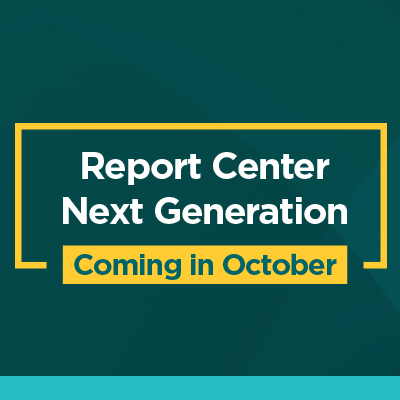
Report Center Next Generation Coming in October!
As mentioned in our we’re excited to announce that Report Center Next Generation will begin rolling out in Employee Self-Service starting mid-October. This phased launch will bring powerful new tools and features to enhance your reporting experience.
What’s New in Report Center:
- Data Visualizations: Simplify complex data analysis with easy-to-use visual tools.
- New Dashboard Displays: Get a clearer, more intuitive view of the data that matters most.
- Advanced Report Building: Create, save, share, and schedule reports with ease.
What’s Next:
- Beta Testing: Limited client beta testing began in July, and the feedback has been overwhelmingly positive.
- Training: Join our client training webinar series in late September to get hands-on experience with the new features.
- Phased Release: The rollout will begin in mid-October and continue through the fourth quarter of 2024, with ongoing enhancements to dashboards and visualizations.
For more information or if you have any questions, please reach out to Megan Barnason at mbarnason@prestigepeo.com or our CTO, Joe Dodgson, at jdodgson@prestigepeo.com.

Florida Minimum Wage Increase
Effective September 30, 2024, the minimum wage for non-tipped employees in Florida increases to $13.00 an hour, and the required hourly wage for tipped employees increases to $9.98. This is part of a gradual increase that was approved by Florida voters in 2020. The minimum wage will continue to increase annually by $1 until it reaches $15 per hour for non-tipped employees and $10.98 for tipped employees, on September 30, 2026.
What Should Employers Do Next?
All Florida employers are required to post the current minimum wage in their place of business where an employee can see it.
PrestigePEO is here to help.
PrestigePEO is focused on supporting your business and will continue to monitor these Department of Labor regulations. If you have questions, please contact your Payroll Specialist or HRBP.

Stay Informed: Important Compliance Updates to Know
Reminder: Nationwide Non-Compete Ban Struck Down
In a major legal development, the Federal Trade Commission’s (FTC) controversial nationwide ban on non-compete agreements was struck down by a federal court in Texas. The ruling was handed down just weeks before the ban was set to take effect on September 4, 2024, halting enforcement of the non-compete ban across the nation.
As anticipated, the final ruling arrived before August 30, with the court declaring the FTC’s non-compete rule an invalid exercise of the agency’s power. The U.S. District Court for the Northern District of Texas ruled that the FTC exceeded its authority by attempting to implement the ban, stating that Congress only empowered the agency to create procedural, not substantive rules, and that that the rule itself was “arbitrary and capricious.”
Consequently, the ruling blocks the ban from taking effect nationwide, allowing businesses to continue using and enforcing non-compete agreements as permitted under state law to safeguard their key relationships and confidential information.
PrestigePEO will keep you updated with further analysis as the situation evolves.
9/11 Notice Act – Frequently Asked Questions
Recently, New York State’s legislature passed and Governor Hochul signed into law the 9/11 Notice Act, the first law of its kind in the United States.
The act will help hundreds of thousands of people who worked in Lower Manhattan on and after 9/11 and were exposed to Ground Zero toxins to access free health care and compensation for 9/11-related cancers and respiratory illness, by requiring businesses and institutions to inform eligible workers of their rights.
Q: What is the 9/11 Notice Act?
A: The act requires businesses and institutions that had people return to the Ground Zero exposure zones (south of Houston Street for the World Trade Center (WTC) Health Program and south of Canal Street for the 9/11 Victim Compensation Fund (VCF) between 9/11/2001 and 5/31/2002 to notify them about their eligibility for the health program and the compensation fund.
The act was passed unanimously in the New York State Legislature and signed into law by Governor Kathy Hochul on September 11, 2023 – the 22nd anniversary of the terrorist attacks.
New York State’s Department of Labor and Department of Economic Development will coordinate to develop a plan to provide adequate notice of the benefits available.
Q: Why is the 9/11 Notice Act important?
A: The act will help to inform many of the 400,000 survivors – people who worked in Lower Manhattan on or after 9/11 – about their right to access the World Trade Center (WTC) Health Program and the 9/11 Victim Compensation Fund (VCF).
All of the survivors have an increased risk of developing 69 different types of cancer and many severe respiratory illnesses.
Presently, fewer than 10% of 9/11 survivors are enrolled in the health program or registered with the compensation fund – compared with 85% of 9/11 responders.
Many of the 300,000 downtown workers have since moved away from the New York City area and are unaware of their right to access the WTC Health Program and the 9/11 VCF.
Q: Where do I get more information about the 9/11 Notice Act?
To read the text of the 9/11 Notice Act, visit:
https://www.nysenate.gov/legislation/bills/2023/S2946/amendment/B
For up-to-date details about the 9/11 Notice Act or if you need a referral to a firm handling 9/11 Notice Act compliance or cases, please contact Prestige’s Compliance Department. The final regulations that define the responsibilities of businesses and institutions are expected to be released in the coming months.
Not All Medical Conditions are Protected by the ADA
Americans with Disabilities Act (ADA) of 1990 is a federal law designed to safeguard individuals with disabilities from discrimination and ensure equal opportunities across various areas. This law encompasses five titles addressing employment, public services, public accommodations, telecommunications, and miscellaneous provisions. This legislation is a significant commitment to civil rights and equality, aimed at reducing barriers and promoting accessibility. The EEOC is a U.S. Federal agency which is also committed to ensuring and enforcing laws and regulations that prohibit workplace discrimination. Below we have provided a detailed look of the ADA’s latest news on disability discrimination.
The Sixth Circuit of Appeals ruled recently that the ADA does not cover medical conditions that do not substantially limit a major life activity. The decision was reached by a split three-judge panel which concluded that the severity of a Plaintiff’s asthma in the Plaintiff’s case did not meet the ADA’s specifications that it limit a major life activity. This ruling emphasizes the interpretation of what constitutes a protected disability, which can vary depending on the facts of each case. The ADA states that a disability is a physical or mental impairment that can limit one or more major life activities. This recent ruling may not universally apply to all cases involving medical conditions. Other courts or future rulings in other circuits can find a determination based on a range of factors in the law and in specific circumstances. What this ruling does is remind employers and employees that not all medical conditions qualify as an ADA protected medical condition and employers need to carefully evaluate each condition in which an employee may need an accommodation.
What Should Employers Do Next?
Employers should carefully review any requests for an accommodation to make sure that the medical condition presented is covered by the ADA.
PrestigePEO is here to help.
PrestigePEO is focused on supporting your business and will continue to monitor these new regulations and related litigation. If you have questions, please contact your HRBP for assistance.
California -New Proposed Bills
We are currently watching several important bills outlined below that have been proposed to Governor Newsome on August 31, 2024. We will continue to monitor these bills and will let you know if any of them get passed.
- SB 1047–Artificial Intelligence Safety bill – This bill seeks to add new requirements to developments of large AI models.
- SB 399–Ban on Captive Audience Meetings – This bill would limit an employer’s ability to communicate with employees regarding political or religious matter during mandatory meetings.
- AB 2499–Victims of Violence– The bill proposes an expansion to the definition of “family member” who may be a victim of crime. It will prohibit an employer from discharging or in any other discriminating manner against an employee because of the employee’s status as a victim of crime or abuse or for taking time off for specified purposes.
- SB 1100- Employment Discrimination and Driver’s License – This bill would prohibit employers from advertising positions that require driver’s license.
- AB 3232- Social Compliance Audits -This bill requires to post a link to a report on their website detailing the finding of social compliance audits related to child labor compliance.
- SB 988 -Freelance Workers – This bill would require employers to provide an agreement for compensation requirements to freelance workers, which may also be independent contractors.
- SB 1022- Enforcement of Civil Rights – This bill will increase the statute of limitations for “group or class complaints” brought with California Civil Rights Department to seven years.
- SB 1299- Farmworkers and Workers’ Compensation – The existing law establishes workers’ compensation to compensate employees for injuries sustained in the course of employment. The proposed bill would create a “disputable presumption that a heat-related injury that develops within a specified timeframe after working outdoors for an employer in the agriculture industry that fails to comply with heat illness prevention standards, as defined, arose out of and came in the course of employment. The bill will require the appeals board to find in favor of the employee if the employer fails to rebut the presumption”. The bill would specify “that compensation awarded for heat-related injury to farmworkers is to include, among other things, medical treatment and disability”. (An act to amend Section 3212.81 to, the Labor Code, relating to workers’ compensation)
- SB 1340– Local Enforcement of Employment Discrimination Law -This bill proposed will prohibit discrimination in employment and will authorize local jurisdictions to enforce local employment discrimination laws that less stringent than the state law.
- AB 1034 Labor Code Private Attorneys General Act of 2004– Under the current PAGA exemption, this bill will extend coverage of Collective Bargaining Agreement for construction employers until January 1, 2038. The current Collective Bargaining Agreements are due to expire on January 1, 2025.
PrestigePEO is here to help.
PrestigePEO is focused on supporting your business and will continue to monitor these pending regulations. If you have questions, please contact your HRBP for assistance.
Massachusetts Pay Transparency & EEO Reporting
On July 31, 2024, Massachusetts Governor Maura Healey signed An Act Relative to Salary Range Transparency (Bill H.4890). This new law sets out the requirements for covered employers in the Commonwealth as it relates to incorporating pay ranges in job postings, effective July 31, 2025. Additionally, the law also sets out new EEO reporting and pay data reporting requirements for certain employers, with the first round of reporting due to the Massachusetts Department of Labor by February 1, 2025.
Massachusetts Pay Transparency
Definitions[1]:
- “Covered Employer” – Massachusetts employers with twenty-five (25) or more employees in the Commonwealth.
- “Pay Range” – the hourly wage range or annual salary range the employer expects to pay for the position at the time it is posted.
- “Posting” – job advertisements or job postings intended to recruit applicants for a specific position and includes what is posted by the employer or on behalf of the employer.
What is Required of Employers?
- Covered Employers and/or their agents, must include the pay range of a position in job postings if the job could be completed in Massachusetts.
- Upon request, covered employers, and/or their agents, are to provide the pay range for a position to an existing employee who is offered a new position within the company that has different job responsibilities; to an existing employee who is receiving a promotion; or to an existing employee who is to be transferred.
- Upon request, covered employers, and/or their agents, shall also provide the pay ranges for a specific position to an employee currently holding the position or to an applicant to the position.
What happens if Employers do not comply with the new law?
- First Violation – Employer will be issued a warning
- Second Violation – Employer will be fined up to $500
- Third Violation – Employer will be fined up to $1,000
- Fourth Violation (& additional violations) – Employer will be fined between $7,500 to $25,000
Retaliation is prohibited by Employers:
- This new law makes it unlawful for an employer to retaliate against an applicant or employee who has enforced their rights under this new law.
Massachusetts EEO and Pay Data Reporting
Who is required to Report?
- Private employers with 100 or more employees within Massachusetts during the calendar year preceding the reporting deadline and who are subject to EEO-1 reporting.
When and What are Employers required to report?
- Employers who qualify are annually required to submit an EEO data report to the Secretary of the Commonwealth by February 1st. The EEO data report includes aggregate wage data categorized by job category, ethnicity, race, and sex. This data will be shared with the Massachusetts Department of Labor but it has been determined that the data provided pursuant to this new EEO reporting law will not be defined as a public record for the purposes of the Massachusetts Public Records Law.
PrestigePEO is here to help and will continue to monitor for any additional guidance provided by the Commonwealth of Massachusetts as we draw nearer to the effective dates.
[1] https://www.mass.gov/doc/h4890-signing/download
California PAGA Update- (Turrieta v. Lyft, Inc. (2024) 16 Cal.5th 664.)
As a follow up to our Insight article related to the Private Attorneys General Act (PAGA), a California Supreme Court has recently come out with an important decision in Turrieta v. Lyft, Inc., ruling in favor of California employers. The Court has decided that Plaintiffs do not have their right to intervene in the ongoing PAGA litigation action of another Plaintiff. Additionally, the Court ruled that Plaintiffs will not be able to “assert overlapping claims, object to proposed settlement, or move to vacate judgment in that action.” The opinion of the Court can be found here.
PrestigePEO is here to help.
PrestigePEO is focused on supporting your business and will continue to monitor these pending regulations. If you have questions, please contact your HRBP for assistance.
Michigan Supreme Court Reshapes Paid Sick Leave Requirements,
Effective February 2025
A July 31, 2024, Michigan State Supreme Court ruling on pending litigation involving the Michigan Earned Sick Time Act (ESTA) has dramatically changed employer obligations that will become effective on February 21, 2025. The lengthy litigation history stems from a 2018 voter initiative involving sick leave that although securing enough voter signatures to go on the ballot for voter approval, was instead adopted by Michigan lawmakers. Once adopted, lawmakers significantly changed the proposed sick leave initiative and within the same 2018 legislative session, revamped and renamed it as the Paid Medical Leave Act (PMLA). This “adopt and amend” process, which has endured protracted litigation, resulted in the Supreme Court’s ultimate ruling that it was unconstitutional. Accordingly, the court found that Michigan lawmakers violated “the people’s initiative rights,” resulting in reversion to the original ESTA proposal, effective February 21, 2025.
The Earned Sick Time Act will now require employers to provide, in some instances, more generous sick leave than the current PMLA. As of February 21, 2025, Michigan employers, with one or more employees will be required to provide one hour of paid sick leave for every 30 hours worked, up to 72 hours a year. These provisions apply to salaried and hourly workers. For employers with 10 or fewer employees, employees will be permitted to accrue one hour for every 30 hours worked, up to 40 hours, of PAID sick leave per year and additional 32 hours of UNPAID sick time, as it is accrued for a total of 72 hours. For employers with more than 10 employees, workers will be allowed at least 72 hours of PAID sick time per year, to the extent it is accrued at the rate of one hour for every 30 hours worked.
Accrual will begin on February 21, 2025, or the first day of employment, whichever is later. The benefit year will run a consecutive twelve-month period as outlined by the employer. Unused, earned sick time will carryover from benefit year to benefit year, but the employer may restrict usage to the annual 72 hours of sick time in the benefit year. The ESTA also provides employees and former employees a private cause of action for damages caused by any violations. Liquidated damages, back pay, reinstatement, and attorney’s fees may also be applicable.
This Michigan Supreme Court ruling also impacts future minimum wage requirements and the tipped hourly wage; however, details regarding these requirements have not yet been finalized.
PrestigePEO is here to help and will continue to monitor and provide updates as additional information on these changes become available.

Need Help Choosing the Right Employee Benefits?
Choosing the right employee benefits can significantly impact your business’s success and employee satisfaction. This blog post provides valuable insights into selecting the best benefits for your team, helping you understand critical considerations and make informed decisions. Whether you’re evaluating healthcare options, retirement plans, or other benefits, this guide offers practical tips to ensure you meet your employees’ needs while aligning with your business goals.
Feedback
We’d love to hear from you. Whether you have an idea for a future newsletter, or if you’re interested in being a podcast guest, let us know! Additionally, if you’d like more information on our services or programs, we can certainly accommodate that as well. Email marketingteam@prestigepeo.com today!
